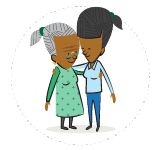Latest news for older people in November 2020

Here’s our latest update on issues affecting the lives of our senior population this week. Many changes and updates are regional, with the most publicity as ever being given to what’s happening in England. Rules around the pandemic and support for older people are increasingly different across the UK, so it’s worth checking updates on your national and local government websites.
- Keeping energy costs down – the choices
- Pension underpayments and delays to the dashboard
- Changes in allowances in Scotland
- Report on Continuous Healthcare funding highlights failings
- Hospital discharge in pandemic needs improvement
- New guidance on visiting care homes
- Update on advice for the vulnerable during the second lockdown
Energy costs in winter
 Keeping energy bills down is an important part of staying warm within budget. The Big Energy Saving Winter is a national campaign in England and Wales to help people cut their bills and make sure they’re receiving all the financial support that they should. Backed by the likes of the Citizens Advice service, the independent Energy Saving Trust and the Department for Business, Energy & Industrial Strategy, the site enables you to check if you or others are eligible for discounts and grants, switch tariffs, and become more energy efficient.
Keeping energy bills down is an important part of staying warm within budget. The Big Energy Saving Winter is a national campaign in England and Wales to help people cut their bills and make sure they’re receiving all the financial support that they should. Backed by the likes of the Citizens Advice service, the independent Energy Saving Trust and the Department for Business, Energy & Industrial Strategy, the site enables you to check if you or others are eligible for discounts and grants, switch tariffs, and become more energy efficient.
If you want to compare fuel prices further, Money Supermarket has its own compare and switch service.
Turning down the thermostat by one degree could save up to £80 a year, says energy switch site Uswitch. The company notes that Age UK recommends older people keep the rooms they use at 21 degrees.
Underpaid pensions and delays for the dashboard
 There’s news on the refunds due to some women for underpaid state pensions. The cases relate to the pre-2016 state pension system where women could claim their pension based on the national insurance record of their husband. While most payments have been correct there is a significant number of women who may have been paid too little. LCP has designed a website calculator to help married women work out if they are being underpaid. The site has had over a quarter of a million hits to date.
There’s news on the refunds due to some women for underpaid state pensions. The cases relate to the pre-2016 state pension system where women could claim their pension based on the national insurance record of their husband. While most payments have been correct there is a significant number of women who may have been paid too little. LCP has designed a website calculator to help married women work out if they are being underpaid. The site has had over a quarter of a million hits to date.
The promised pensions dashboard that would enable people to keep track of all their retirement savings in one place has been delayed again. Expected to be available this year, the online service is now due for delivery in 2023.
Allowance changes in Scotland
Attendance Allowance is due to be replaced in Scotland by the new Pension Age Disability Payment. This is aimed at supporting older people who have a disability that means they need help with looking after themselves or supervision to keep them safe. It’s expected that eligibility rules will be similar. There are further changes to allowances such as PIP on the way in Scotland.
Continuing Healthcare funding isn’t working
 Continuing Healthcare funding has been a source of much frustration for some years. Now the Parliamentary and Health Service Ombudsman has released a report based on the cases brought to it and resolved over the last three years. The ombudsman found that failings in care and support planning has resulted in individuals and their families having to top up the funding provided by the NHS CHC. At the same time, poor communication around care plans and packages often meant that people were unaware of their entitlements and the process of challenging decisions they believe to be incorrect. The committee says that CCGs, with support from NHS England and NHS Improvement, need to make sure that frontline staff have the skills and resources to deliver high-quality, comprehensive and inclusive care and support planning that meets individual care needs. The report also highlights the importance of good communication and involvement, so people are aware of what is covered in an NHS CHC package and how to challenge decisions about them. As a result of these findings, the committee has made a range of recommendations around delivering a better service, while admitting that during the current pandemic limited progress is likely. However, Beacon CHC, a social enterprise with expertise in the area, has arguing that the current rules are extensive and clear, and that what’s needed is greater accountability to prevent CCGs from routinely ignoring them. You can find more about CHC funding on our finance pages.
Continuing Healthcare funding has been a source of much frustration for some years. Now the Parliamentary and Health Service Ombudsman has released a report based on the cases brought to it and resolved over the last three years. The ombudsman found that failings in care and support planning has resulted in individuals and their families having to top up the funding provided by the NHS CHC. At the same time, poor communication around care plans and packages often meant that people were unaware of their entitlements and the process of challenging decisions they believe to be incorrect. The committee says that CCGs, with support from NHS England and NHS Improvement, need to make sure that frontline staff have the skills and resources to deliver high-quality, comprehensive and inclusive care and support planning that meets individual care needs. The report also highlights the importance of good communication and involvement, so people are aware of what is covered in an NHS CHC package and how to challenge decisions about them. As a result of these findings, the committee has made a range of recommendations around delivering a better service, while admitting that during the current pandemic limited progress is likely. However, Beacon CHC, a social enterprise with expertise in the area, has arguing that the current rules are extensive and clear, and that what’s needed is greater accountability to prevent CCGs from routinely ignoring them. You can find more about CHC funding on our finance pages.
Hospital discharge needs improving
Meanwhile a report from Healthwatch and the British Red Cross finds that leaving hospital during the pandemic is a very different experience to before the virus struck. Looking at almost 600 people’s stories, the report looks at the effects of the ‘Discharge to Assess’ model, where people are helped to leave hospital faster by having their ongoing care needs assessed at home. While there was much praise for the staff and the national approach was welcomed by respondents, several gaps in the process have emerged. These range from basic checks, such as whether people had transport to get home, from not having proper follow-up on the community so that necessary equipment and medication failed to materialise. The issue of testing for Covid-19 before discharge also loomed large in people’s concerns. Read more about thechanges to hospital discharge procedures during the pandemic.
Visiting residents in care homes – new guidance
 A judge has commented that care home residents in England are legally allowed visitors from friends and family, despite recent government policy that has been seen as a ban on visits in many areas. Meanwhile the situation regarding care home visiting in England appears to have improved in principle, with the government encouraging homes to allow visitors, but in a highly Covid-secure way, which many fear won’t be achievable.
A judge has commented that care home residents in England are legally allowed visitors from friends and family, despite recent government policy that has been seen as a ban on visits in many areas. Meanwhile the situation regarding care home visiting in England appears to have improved in principle, with the government encouraging homes to allow visitors, but in a highly Covid-secure way, which many fear won’t be achievable.
Update on England’s lockdown for the vulnerable
There’s new guidance for the ‘clinically extremely vulnerable’ in England. People in this group will have previously received a letter and advice if they are deemed to be in this group. Rather than being told to stay in completely, people in this group are now asked to remain at home as much as possible, except to go outdoors to exercise or attend essential health appointments. They can meet up with one other person from outside their household or support bubble, to exercise in an outdoor public place, for example. Otherwise the advice is to keep contact with others to a minimum and avoid busy areas. They should also avoid all non-essential travel by public or private transport, but, importantly, still go to hospital and GP appointments. NHS Volunteer Responders are available to help with travel to appointments – and patients are advised to contact their GP if they need help. It’s all fairly standard stuff -shop online if possible or ask friends or family or a volunteer to do the shopping for you. Those with priority delivery slots will still be able to use those. This group is also advised not to go to pharmacies but to ask someone else to collect the medicines. If that’s not going to work, contact the pharmacy and they will arrange delivery free of charge. Care provision should continue. The government also advises registering on the new online service provided by local councils, even if no support is needed right now.
About being an attorney during the pandemic
There is revised guidance on the uk.gov website for England:
- Guidance on being a deputy or attorney during the coronavirus outbreak
- Making and registering an LPA
- Registering an EPA
- Working with the Office of the Public Guardian
- Also useful – Rules on giving gifts
When They Get Older in the news
Delighted to have contributed to a discussion on enjoying a Covid-safe family Christmas this year.

